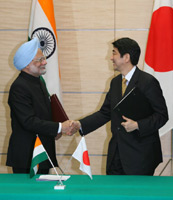TOKYO -- Reports that India's nuclear deal with the United States is faltering have prompted a string of gloomy editorials in Indian newspapers. With the government of Indian Prime Minister Manmohan Singh apparently reluctant to face down opposition from its Communists allies, the deal is, as the Times of India lamented, "probably . . . in the deep freezer." But 3,500 miles away in Tokyo, recently installed Japanese Prime Minister Yasuo Fukuda may not be feeling quite so gloomy, for the deal risked becoming an awkward sticking point in the blossoming relationship between nuclear state India and the avowedly anti-nuclear Japan. "Japan would not be able to support a deal openly," says Takako Hirose, professor of South Asian politics at Senshu University in Tokyo. "The relationship with India is important, but so is domestic opposition."
Do Stronger Japan-India Ties Herald an Asian Alliance of Democracies?

